Fox News Flash top headlines for December 17
Fox News Flash top headlines are here. Check out what's clicking on Foxnews.com.
Fraternity members and students from the University of North Carolina and Duke University were part of a massive drug trafficking ring that for years funneled drugs into three college campuses, federal prosecutors announced Thursday.
Federal law enforcement agents most recently charged 21 people in connection with the scheme following an investigation that began in November 2018.
The illegal drug activity involved members of chapters of Phi Gamma Delta, Kappa Sigma, and Beta Theta Pi fraternities at the University of North Carolina at Chapel Hill between 2017 and the spring of 2020, according to court filings.
The drug ring funneled more than a half-ton of marijuana, several hundred kilograms of cocaine and significant quantities of other drugs into UNC-Chapel Hill, Duke University and Appalachian State University, prosecutors said.
Prosecutors said the total amount of money made through the trafficking scheme was not immediately available, but exceeded $1,500,000.
The suspects range in age from 21 to 35, with the majority being in their mid-20s. It’s unclear how many are or were students at the three schools.
"I want to make it very clear: This is not the situation where you have single users — where you have a 19-year-old sipping a beer or you have someone who is taking a puff of a joint on the back porch of a frat house," U.S. Attorney Matthew G.T. Martin said at a news conference, according to The News & Observer of Raleigh. "These are 21 hardened drug dealers."
In an emailed statement on Thursday afternoon, UNC-Chapel Hill Chancellor Kevin Guskiewicz said none of the suspects is currently enrolled as a UNC student, but the school "will remain vigilant" in combating illegal drug use.
"The University is committed to working with law enforcement to fully understand the involvement of any university individuals or organizations so that disciplinary action can be taken," Guskiewicz said.
Court documents said investigators used information from sources and defendants as well as undercover purchases and surveillance. They determined the suspects were shipping cocaine from California via the U.S. Postal Service and moving marijuana by motor vehicles.
The investigation was conducted by the U.S. Drug Enforcement Administration and the Orange County Sheriff’s Office, the U.S. Attorney’s Office in Greensboro said in a news release.
Authorities identified Francisco Javier Ochoa Jr., 27, of Turlock, Calif., as the first person charged in the investigation. According to the U.S. Attorney's Office, Ochoa was indicted in November 2019 for conspiracy to distribute 5 kilograms (11 pounds) or more of cocaine and conspiracy to distribute 100 kilograms (220 pounds) or more of marijuana.
STUDENT'S BODY FOUND ON MICHIGAN CAMPUS, POLICE INVESTIGATING DEATH AS SUSPICIOUS
According to court documents, Ochoa supplied about 90 kilograms (200 pounds) of marijuana and 2 kilograms (4.4 pounds) of cocaine weekly to a person who was cooperating with investigators in Orange County from March 2017 until March 22, 2019.
CLICK HERE TO GET THE FOX NEWS APP
Ochoa pleaded guilty and was sentenced last month to 73 months in prison and five years of supervised release. He also was ordered to pay a $250,000 forfeiture judgment, prosecutors said. Attorneys for Ochoa didn't immediately respond to an email Thursday seeking comment.
Between July and December 2020, an additional 20 defendants were charged, the U.S. Attorney's Office said. Five were charged by a grand jury with conspiracy to distribute cocaine and conspiracy to distribute marijuana. Eight more were charged with conspiracy to distribute cocaine, and seven more were charged in October and December with various offenses.
The Associated Press contributed to this report.












































